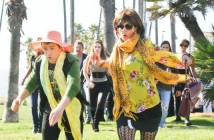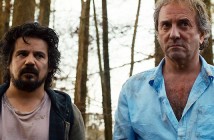Cast: Felix Bruzzone, José Campusano, Lucía Cedrón
Director: Nicolás Prividera
Country: Argentina
Genre: Documentary
Official Trailer: Here
Any film about history has to deal with time. In at least two ways: as historical time, the length of years, decades, or centuries being described; and as running time, the window of two movie hours in which the chosen segment of historical time is portrayed. A film dealing with the history of an entire country, even a young one like Argentina, is even more complicated. How to summarize so much in so little time? More importantly, how to trace the complex web of ideologies, passions, prophetic visions, and mortal hatreds that shaped the national soul, and do it in a readable or watchable fashion? What to emphasize and what to ignore? A work of history always simplifies and it must concern itself with how to simplify and where.
Nicolás Prividera’s Fatherland doesn’t ignore this. Indeed, it makes historical simplification one of its main themes. This is a film about how succeeding generations simplified and streamlined the record of their times, how they divided up their evolving nation into competing camps in order to explain the disagreements of their age. Prividera visited the Recoleta cemetery in the city of Buenos Aires with a reflex camera, and, during the course of a month, filmed modern day Argentine citizens as they read texts belonging to or referencing the buried figures in the mausoleums behind them. Interspersed between the recitations are observational images of the cemetery: hunting cats jostling over a bird, maintenance personnel going through the motions of their workday, wandering tourists smiling during a stroll, nostalgic seniors chanting an old song for Juan Domingo Perón. The Recoleta cemetery is, as Prividera has said, a city within a city. Inside its walls are the elaborate tombs of many significant Argentine political and literary figures. Each mausoleum is a riddle of symbolism and sculpture, and all the vaults are interconnected by passages of varying width, so that visitors might be confused as pedestrians in a city of miniature temples for the dead.
Prividera visited the Recoleta cemetery in the city of Buenos Aires with a reflex camera, and, during the course of a month, filmed modern day Argentine citizens as they read texts belonging to or referencing the buried figures in the mausoleums behind them.
Prividera, in crafting Fatherland, was openly inspired by John Gianvito’s Profit Motive and the Whispering Wind. For this experimental documentary, released in 2007, the American professor and director traveled to the marked and unmarked resting places of both famous and forgotten participants in the social struggles of the United States, and aimed his camera at the adjacent signs and plaques explaining the historical importance of the buried names. What is interesting about these commemorative inscriptions is not only their content, but where they are located: inside the banality of a parking lot, besides a related sculpture, next to the transient blur of a highway. Each setting implies something about how and where we choose to remind ourselves of our history. Prividera repurposed this concept for Fatherland, but with some fundamental changes: the Argentine filmmaker constrained himself to a single necropolis, whereas Gianvito drove all over the United States; and the texts in Fatherland do not evoke the past, like those in Profit Motive, but come directly from it. The signs filmed by Gianvito were not written by the makers of history, but by those who chose to remember them; Prividera, on the other hand, uses almost no retrospective texts, as his modern Argentine citizens read the ink scribbled by actual historical figures. The past, then, is not remembered or memorialized in a plaque, but is rather reinterpreted. Even if the texts come from the past, they are not the past itself, since every act of readership receives the words differently. Prividera’s modern-day reciters are clumsy and often struggle with the language. A few try to be operatic, their enunciations slow and pedantic; others are more candid, somewhat bemused; many seem aware of the content of the words; and some read mindlessly and listlessly. In all cases, the texts, plucked from the past, are renewed in our present.
 Although some minor knowledge of Argentine history is preferred, it’s not essential for an appreciation of Fatherland. Prividera selected his textual passages very carefully, copying and pasting them onto a big red book, which is what the on-screen readers hold in their hands. The passages belong to a range of authors: from Domingo Faustino Sarmiento and Juan Manuel de Rosas, political figureheads during the 1800s; to Evita Perón, wife of the adored and reviled leader; to writers and journalists like Leopoldo Lugones and Rodolfo Walsh. Prividera juxtaposes all of these distinct voices in such a way that the uninitiated can still understand the larger historical processes. The order of these textual passages is roughly chronological. Although there is much shuffling to and fro across the years, the general movement is forward in time. We can trace, then, how the debate about Argentina developed from one century to the next, how certain individuals wrote and spoke about westward expansion and the murder of native tribes, about urban civilization and the supposed savagery of the rural provinces, about immigration and the loss of ethnic purity, about modernity and its costs, about the poor and the aristocracy, about dictatorship and “subversion,” about political prisoners and torture. Without knowing the authors, we can still grasp what they’re talking about.
Although some minor knowledge of Argentine history is preferred, it’s not essential for an appreciation of Fatherland. Prividera selected his textual passages very carefully, copying and pasting them onto a big red book, which is what the on-screen readers hold in their hands. The passages belong to a range of authors: from Domingo Faustino Sarmiento and Juan Manuel de Rosas, political figureheads during the 1800s; to Evita Perón, wife of the adored and reviled leader; to writers and journalists like Leopoldo Lugones and Rodolfo Walsh. Prividera juxtaposes all of these distinct voices in such a way that the uninitiated can still understand the larger historical processes. The order of these textual passages is roughly chronological. Although there is much shuffling to and fro across the years, the general movement is forward in time. We can trace, then, how the debate about Argentina developed from one century to the next, how certain individuals wrote and spoke about westward expansion and the murder of native tribes, about urban civilization and the supposed savagery of the rural provinces, about immigration and the loss of ethnic purity, about modernity and its costs, about the poor and the aristocracy, about dictatorship and “subversion,” about political prisoners and torture. Without knowing the authors, we can still grasp what they’re talking about.
Indeed, it might be preferable to know nothing about them. Those who do might take issue with the film for ignoring their human complexity. No quote, no fragment from a novel or essay, no matter how revealing, can account for the ideology or worldview of a man or woman. In many ways, Fatherland says nothing about Sarmiento, or Rosas, or Evita. But it does present us with some of the things they said, contrasting their voices with those of others, so that, rather than the history of Argentina, Fatherland is about the history of a conversation about Argentina. One of the last scenes in the film is a series of shots moving progressively towards a bird’s eye view of the cemetery. As each shot scales further up, the soundtrack is filled with more and more voices, until we can hear only a torrent of noise, a congress of ghosts.
In many ways, Fatherland says nothing about Sarmiento, or Rosas, or Evita. But it does present us with some of the things they said, contrasting their voices with those of others, so that, rather than the history of Argentina, Fatherland is about the history of a conversation about Argentina.
Because of its running time, Fatherland cannot relate anything about its subject matter that would exceed the limits of a medium-length essay. In order to work as film, then, its merits must be poetic and its content suggestive, since historical thoroughness is out of the question. On some points, its poetry fails. The film’s opening minutes host an exceedingly blunt collage of mostly black and white newsreels, edited to the sound of the national anthem, which punctuates violent moments in Argentine history. Later on, and throughout the running time, most recitations end with the slow disappearance of the reader, as he or she vanishes like a specter, or a fading double exposure, upon the background of the cemetery, which would have been an evocative effect on celluloid but looks irksome and cheap on digital.
 Still, most of Prividera’s aesthetic choices are successful. His observational tours of the cemetery, which interrupt the stream of readers and citations, open gaps for silence and contemplation. Statues are shown from multiple angles, their expressions of agony or ecstasy framed dramatically, as if they were actors in an eternal stage play, their movements stretching through centuries of decay; cobwebs and the evidence of erosion are found in recondite corners, eluding the supervision of the maintenance personnel; some images look from inside the mausoleums, out through the graying windows invaded by dust and lichen, out towards the little passages where visitors are seen prattling unawares; other images are filmed from outside, looking into the cavernous openings of the mausoleums, their gaping doorways, and we watch as people emerge from the vaults, their faces carefree and buoyant; and all along, we feel the solid presence of the cemetery. It is a tourist attraction, regarded by thousands upon thousands of eyes every year, but Prividera places his camera on a timeless and ethereal plane, sensitive to an unseen and unheard side of the necropolis. As the textual passages reveal further layers of historical hate and violence, nestled into the secret folds of the tombs, the smiling visitors, snapping pictures and chatting pleasantly among themselves, seem oblivious to the past. But these visitors aren’t stupid or ignorant. Fatherland doesn’t criticize them. It rather observes, patiently, how people regularly experience history, not always in school or from books – although these institutions play a role, obviously, and both schoolchildren and books, or a single red book of quotations, feature in Fatherland – but as an environment, a location that whispers more than we can hear.
Still, most of Prividera’s aesthetic choices are successful. His observational tours of the cemetery, which interrupt the stream of readers and citations, open gaps for silence and contemplation. Statues are shown from multiple angles, their expressions of agony or ecstasy framed dramatically, as if they were actors in an eternal stage play, their movements stretching through centuries of decay; cobwebs and the evidence of erosion are found in recondite corners, eluding the supervision of the maintenance personnel; some images look from inside the mausoleums, out through the graying windows invaded by dust and lichen, out towards the little passages where visitors are seen prattling unawares; other images are filmed from outside, looking into the cavernous openings of the mausoleums, their gaping doorways, and we watch as people emerge from the vaults, their faces carefree and buoyant; and all along, we feel the solid presence of the cemetery. It is a tourist attraction, regarded by thousands upon thousands of eyes every year, but Prividera places his camera on a timeless and ethereal plane, sensitive to an unseen and unheard side of the necropolis. As the textual passages reveal further layers of historical hate and violence, nestled into the secret folds of the tombs, the smiling visitors, snapping pictures and chatting pleasantly among themselves, seem oblivious to the past. But these visitors aren’t stupid or ignorant. Fatherland doesn’t criticize them. It rather observes, patiently, how people regularly experience history, not always in school or from books – although these institutions play a role, obviously, and both schoolchildren and books, or a single red book of quotations, feature in Fatherland – but as an environment, a location that whispers more than we can hear.
As the textual passages reveal further layers of historical hate and violence, nestled into the secret folds of the tombs, the smiling visitors, snapping pictures and chatting pleasantly among themselves, seem oblivious to the past.
This timelessness, this ghostly mood, colors the texts being read. Most of them portray a binary Argentina, split into warring teams, us versus them, where the pronouns refer to different social groups depending on the era and the speaker: urban or rural, European or native, right or left, military or guerrilla. Now, admittedly, in every conflict, even when there are two distinct sides, there are also numerous minor contingents and opinions, subtle variations on extreme positions, moderates and lonely renegades, and so on. Yet in political, social, and cultural discourse, in order to make a point and establish a position, the conversation often simplifies and flattens the imperfections and bumps in the ideological landscape. Fatherland, in chronicling this conversation, often seems to itself draw a crude opposition between oppressors and the oppressed. But its aesthetic, its calm and pensive quality, works against such a conclusion. Many of the extracted passages are full of fire and brimstone, harsh visions of sinners and saints, and yet the film is slow, meditative, melancholy. We hear the quotes as something distant, not only in time but in tone and intent. Although some texts are clearly more agreeable than others, and although we can infer with whom Prividera stands, almost none of the textual extracts are offered up as definitive or correct interpretations. Instead, they make up a kind of funeral dirge. These piles of words, some heroic and dignified, some loathsome and racist, some simply misguided, once contributed to giving a nation its shape and identity, spilling its blood in the process. At no point do they illustrate the totality of what Argentina was at any given moment. Instead, they chart the passionate arguments that, simple or not, wrong or not, wrought the passage of history and justified the sculpting of stone mausoleums.
The final shot in Fatherland is a long take filmed from a helicopter, spanning the distance between the neighborhood of Recoleta and the River Plate, scored to Verdi’s Va, pensiero. Those who know its lyrics will catch its relevance to the film. Two of its lines read: “Oh, my country, so beautiful and lost! Oh, remembrance, so dear and so fatal!” Argentina is not lost, but there is no single Argentina. What have been lost are succeeding visions of it, dreams and hopes for its future, designs for its people, all of them waiting now, entombed, to be rediscovered, maybe, for the shaping of another Argentina, also beautiful and forthwith to be lost and remade.
[notification type=”star”]85/100 ~ GREAT. Although some texts are clearly more agreeable than others, and although we can infer with whom Prividera stands, almost none of the textual extracts are offered up as definitive or correct interpretations. Instead, they make up a kind of funeral dirge. These piles of words, some heroic and dignified, some loathsome and racist, some simply misguided, once contributed to giving a nation its shape and identity, spilling its blood in the process.[/notification]



